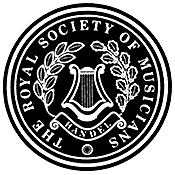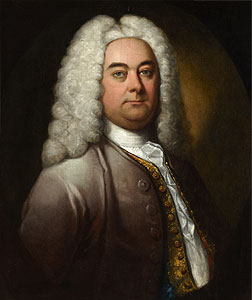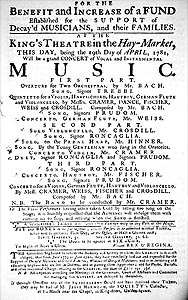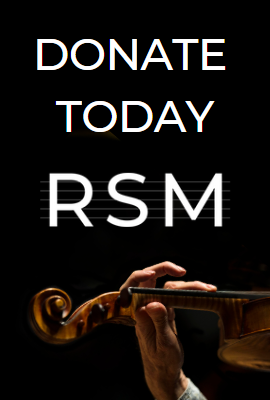The Royal Society of Musicians of Great Britain (RSM) –
A brief history
The Royal Society of Musicians was founded in 1738 as the “Fund for Decay’d Musicians”. 228 members of the profession signed its Declaration of Trust; they included Arne, Boyce, Carey, Festing, Greene, Pepusch, Edward Purcell (son of Henry), Roseingrave, Sammartini, Stanley (the blind organist and composer) and, most valuably, Handel. The Society still maintains at Drummond’s Bank the account which Michael Festing (the first Secretary) opened in November 1738. From the beginning Handel took part in the annual concerts for the Fund’s benefit, and he bequeathed it £1,000 in a 1759 codicil to his Will.
George III gave his patronage to and attended the Handel Festival concerts in 1784, with some 500 performers. This benefited the Society (as it had been called since 1780) by £6,000, and its first Royal Charter was granted in 1790. Its charitable work has unceasingly continued since its foundation. Archives, and a number of fine portraits now in its 18th Century central London house, are viewable by appointment.
Over many years money was received from benefit concerts, and gifts and honorary subscriptions from members of the nobility and the general public. Dinners or “Anniversary Festivals” were held, presided over by distinguished non-members, including Dickens, the Prince of Wales (later Edward VII), Sullivan, and Irving. These proceedings often included performances of Marches written for the Society, by Haydn and Weber amongst others. In 1824, at the age of 12, “Master Liszt (a youth from Hungary)” gave for the Society his first concert in England, and he played for it again in 1827. Mendelssohn and Moscheles extemporized for it, and in 1848 Berlioz responded (in French) to a toast. Dvorák accompanied two of his own songs in 1885. Over the years, most of those who attended became Honorary Subscribers or gave donations, as did members of the Royal Family, Paganini, Meyerbeer, Liszt, and Clara Schumann, and the famous firm of Broadwood. The Society of Female Musicians, launched in 1840, amalgamated with the Society. in 1866.
 By the end of the 19th Century it was prudent for a young musician to seek membership of the Society, to confirm status in the profession, and to be able to call for help if in grave need. (By then, only very limited support could be given to non-members.) But the post-war welfare state and insurance developments led to a decline in the Society’s membership, and a renewed realisation that its aims had originally been for the relief of any professional musicians and their families in serious distress, and not primarily for the protection of Members.
By the end of the 19th Century it was prudent for a young musician to seek membership of the Society, to confirm status in the profession, and to be able to call for help if in grave need. (By then, only very limited support could be given to non-members.) But the post-war welfare state and insurance developments led to a decline in the Society’s membership, and a renewed realisation that its aims had originally been for the relief of any professional musicians and their families in serious distress, and not primarily for the protection of Members.
Changes in the policies were reinforced by its second Royal Charter (in 1987), so that the Society can now help stricken non-members, including students, with the same cautious generosity as its Members.











